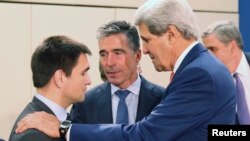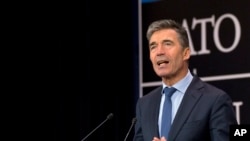U.S. Secretary of State John Kerry said Wednesday Russia's leader must prove he is fully committed to peace in eastern Ukraine through actions, not just words, but the United States and its European allies are not ready to impose new sanctions on Moscow.
Speaking in Brussels, where he attended a meeting of NATO foreign ministers, Kerry said it is "critical" for President Vladimir Putin to "publicly" call for pro-Russian separatists in eastern Ukraine to disarm. He also said Putin must stop the flow of fighters and weapons, including "tanks and rocket launchers," across Russia's border with Ukraine.
"We are not announcing a new round of sanctions today but we are going to continue to take steps to prepare in the event that the circumstances on the ground warrant those sanctions,” Kerry said, according to Reuters. “So, we are coordinating with our European partners in order to prepare for that."
He said Washington is working with European governments on preparing new sanctions, should they be necessary.
The European Union and the United States imposed sanctions against certain Russian individuals and companies earlier this year after Moscow's annexation of Crimea and, later, for its involvement in the unrest in eastern Ukraine.
The United States has threatened sanctions on Russia's financial, defense and high-tech industries as more Russian military equipment has flowed into Ukraine.
Permission withdrawn
In Moscow Wednesday, Russia's upper house of parliament voted to withdraw permission for Russian troops to go into Ukraine, fulfilling a request made by President Vladimir Putin on Tuesday to cancel that permission.
Ukraine's president, Petro Poroshenko, hailed Putin's request as a "practical step" toward peace.
Ukraine's foreign minister also applauded the measure. But, Pavlo Klimkin said at a NATO news conference in Brussels, "we need other positive steps also, like support of the comprehensive (peace) plan by the president, by Russia, and we need of course effective control at the border ...
“And of course it is critical to undertake a number of very urgent measures to build more trust, like releasing hostages," Reuters reported Klimkin as saying.
Klimkin specifically called for the release of eight international monitors for the Organization for Security and Cooperation in Europe, captured in late May along with a Ukrainian interpreter.
NATO skeptical
Meanwhile, the head of NATO said he sees no signs that Russia is respecting its international commitment regarding Ukraine, and added that meetings Wednesday among NATO foreign ministers will address building Ukraine's military capabilities.
Anders Fogh Rasmussen said Wednesday in Brussels that the foreign ministers, including U.S. Secretary of State John Kerry, will "review" relations with Russia and decide what to do next.
Russia could face tougher sanctions from NATO countries if it fails to comply with requests to help end the violence between Ukraine loyalists and Russian separatists within Ukraine's borders.
Moscow's annexation of Ukraine's Crimean peninsula in March sparked several rounds of U.S. and European economic sanctions against senior Russian officials.
At NATO’s summit of foreign ministers, Kerry and his Turkish counterpart, Ahmet Davutoglu, stressed the importance of the relationship between their two countries.
"Turkey is such a key partner in so many ways but particularly given what is happening in Syria and now in Iraq with ISIL," Kerry said after a handshake with Davutoglu, the Associated Press reported.
Davutoglu also acknowledged Turkey’s proximity to southern Ukraine across the Black Sea.
He said it was time for the U.S. and Turkey “to consult more frequently, act together as two strategic allies and that cooperation will continue in all fields," the AP reported.
Leaders consult
Meanwhile, in a phone call Wednesday, the leaders of Russia, Ukraine, France and Germany agreed the OSCE hostages in eastern Ukraine should be released immediately, the AP reported.
The news service cited German Chancellor Angela Merkel’s spokesman, Steffen Seibert, as saying the leaders also agreed upon the need to oversee a Ukraine cease-fire and monitor the country’s border with Russia. There was no word on how that would be achieved.
In meeting with Germany's parliament, Merkel had indicated her desire for Putin to actively support the cease-fire scheduled to run out Friday.
"Progress is slow,” she told legislators, according to Reuters. "Diplomatic solutions are always preferable but, if nothing else works, sanctions can be put back on the agenda.''
On Tuesday, Putin had insisted that, with the cease-fire, Ukraine should open talks on the rights of the country’s Russian speakers. Some have felt disenfranchised since the February removal of Viktor Yanukovich, the former pro-Russia president.
His successor, Poroshenko, said he expected to present a bill Thursday to parliament on increased regional autonomy.
But the peace process has come under fire, given continued fighting.
Copter shot down
On Tuesday, Ukraine said pro-Russian separatists near the Russian border shot down a Ukrainian military helicopter, killing at least nine servicemen.
The downing near the eastern city of Slovyansk, a rebel stronghold, came less than a day after rebels announced a temporary cease-fire in their push to gain autonomy from the Kyiv government. The truce was to have run parallel to a weeklong cease-fire declared by Kyiv on Friday.
The status of the Ukrainian government truce remained unclear late Tuesday. But Poroshenko, in a statement, said rebels had violated their own peace offering. He also ordered government forces to open fire "without hesitation" if attacked.
NATO has accused Russia of supporting the separatists in Ukraine, but Russia denies it.
In New York Tuesday, senior United Nations human rights official Ivan Simonovic warned the U.N. Security Council that the situation in eastern Ukraine is rapidly deteriorating. He said 423 people were killed in fighting in the east between April 15 and June 20, and said the cross-border flow of arms and Russian recruits to the region is increasing.







